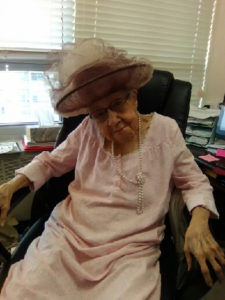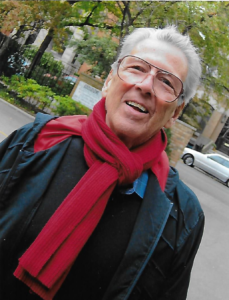Wanda’s Stories Live On
November 10, 2022 • 23 Comments • Posted in Blogroll, careers/jobs for people who are blind, memoir writing, teaching memoirWe got the news Monday morning. Our dear friend Wanda Bridgeforth had died. Wanda’s daughter, Wanda Jr., had texted me last week to let me know “Mama is in hospice care at home.” She added, “Don’t be sad about this, Mama l-i-v-e-d long…and much!”
I was grateful to Junior for that message — her letting me know about hospice made the news about Wanda’s death easier to swallow. Wanda was 101 years old. She’d been in my “Me, Myself & I” memoir-writing class 15 years, sharing her life stories there with us every week. What joy and wonderment I feel now, having had the honor to know Wanda , meet her family, laugh with her…it’s all pretty miraculous.
Thinking about Wanda so much this past week got me reminiscing about meeting her for the first time: it all happened when she was in the audience at Printers Row Book Fair in 2007 to see her friend Minerva (another writer in the memoir class I led back then) appear with me at a presentation there. Here’s the story.>

That’s Wanda earlier this year, modeling her 1960 Easter bonnet for her home health care worker.
“Minerva told me she was going to be in the book fair with her teacher, and I should come and meet Beth Finke,” Wanda told me, explaining that Minerva and Wanda had been friends since DuSable High School opened in 1935. Minerva hadn’t mentioned that I was blind, and Wanda was sitting so far back that she didn’t see my Seeing Eye dog Hanni at my feet until she walked up to say hello. “I said ‘Holy Toledo! A blind lady teaching a writing class? This I gotta see!’”
I invited her to sit in on a class, and she signed right up.
Minerva and Wanda brought a slice of Chicago history with them to class every week. Tens of thousands of Southern blacks flooded into Chicago during the Great Migration of the early 20th century. Minerva’s parents came from Georgia, Wanda’s came from Mississippi, and the stories these two read in class describe Bronzeville, the segregated neighborhood they grew up in, as a “city within a city.”
Overcrowding, joblessness, and poverty was a fact of life, but so was literature, jazz, blues, and gospel music.
DuSable High School, the first Chicago high school built exclusively for African-American students, opened in the Bronzeville neighborhood in 1935. Minerva transferred in as a sophomore, and Wanda was a freshman. “I was in the birthday class,” Wanda would remind us any time her beloved high school was mentioned. DuSable was built on Chicago’s South Side 15 years before the Brown v. Board of Education decision. Wanda says it was built to keep schools segregated. “We were blocked in,” she’d write. “We knew not to cross Cottage Grove, 51st Street or the train tracks.” Everyone inside those boundaries was Black. “That was our neighborhood, and DuSable was our neighborhood high school.”
When DuSable first opened, some neighborhood parents applied for permits to get their children into nearby White high schools. “Their parents didn’t think a Black school could be any good,” Wanda wrote, adding that she felt sorry for those kids. True, DuSable classes could be very crowded; she remembers 50 or so students squeezing into classrooms. “But at those other schools, if you were Black and you wanted to be in a play, you had to be a maid or a butler,” she wrote. “At DuSable, we did everything, we were in all the plays, we wrote the school newspaper. We were having such a good time at DuSable.”
Between the two of them, Minerva and Wanda were at the high school between 1935 and 1939. During those years they walked the hallways with some pretty impressive classmates, including Nat King Cole; John H. Johnson, publisher of Ebony and Jet magazines; Harold Washington, first African-American mayor of Chicago; comedian Redd Foxx; and singer Dinah Washington.
“Nat Cole added King to his name later,” Wanda would tell me with a laugh. “You know, like Old King Cole!” They remembered Dinah Washington when she was Ruth Jones, and they knew Redd Foxx as Jon Sanford. “His brother was Fred, that’s who Sanford and Son is named for,” Wanda told us, reminiscing about the old television series. . “They changed their names once they were stars.”
DuSable’s initial fame was in its music program, and Wanda and Minerva both sang during “Hi-Jinks” student talent shows there. “We were in the background, but we put on shows that were better than what was going on in Chicago professional theatres,” Wanda wrote. “With musicians like Ruthie Jones and Nat Cole and all of those guys, we couldn’t miss!”
And with writers like Minerva and Wanda in the memoir-writing classes I’ve led over the years, I couldn’t miss, either. Their stories live on through the essays they wrote — I am so, so grateful. As Wanda always liked to say…”Hugs all around!”


